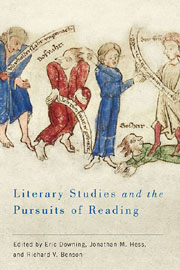Book contents
- Frontmatter
- Contents
- List of Illustrations
- Introduction
- Part I Medieval and Early Modern Practices of Reading
- Part II Reading, Secularization, and Transcendence in the Long Nineteenth Century
- Part III Theories and Practices of Reading in the Twentieth Century and Beyond
- Part IV Postscript: The Ends of Reading
- Works Cited
- Notes on the Contributors
- Index
Introduction
Published online by Cambridge University Press: 05 February 2013
- Frontmatter
- Contents
- List of Illustrations
- Introduction
- Part I Medieval and Early Modern Practices of Reading
- Part II Reading, Secularization, and Transcendence in the Long Nineteenth Century
- Part III Theories and Practices of Reading in the Twentieth Century and Beyond
- Part IV Postscript: The Ends of Reading
- Works Cited
- Notes on the Contributors
- Index
Summary
Beyond the Affective Fallacy?
When Clayton Koelb wrote of the reader and of the inventions and passions of reading back in the 1980s, he was writing at a moment when the figure of the reader and the practice of reading were indeed being newly minted and passionately promoted by literary theorists across the Western world. In the work of Hans Robert Jauss and Wolfgang Iser in Germany, Roland Barthes in France, and Harold Bloom, Stanley Fish, Paul de Man, and Koelb himself in North America, the reader was assuming center stage as the producer of literary meaning, replacing the earlier focus on the role of the text, even as that focus had already pushed aside consideration of the author. The pushing and shoving didn't stop, of course, and as cultural studies and historical approaches to the study of literature gained ascendancy in the decades that followed, reading itself faded from view as a focal point of critical concern. Our sense—echoing that of Koelb's own recent study, The Revivifying Word—is that it is high time that the question of reading be placed back in the spotlight, and in such a way that the more historical and cultural studies oriented approaches of contemporary literary scholarship can be brought to bear on the more purely theoretically conceived topics of the pioneer players in this field. The essays collected in this volume aim in various ways to combine contemporary critical reflections with historical investigations into changing cultural practices and representations of reading.
- Type
- Chapter
- Information
- Literary Studies and the Pursuits of Reading , pp. 1 - 14Publisher: Boydell & BrewerPrint publication year: 2012

